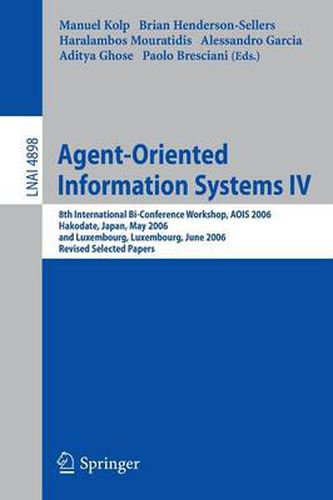Readings Newsletter
Become a Readings Member to make your shopping experience even easier.
Sign in or sign up for free!
You’re not far away from qualifying for FREE standard shipping within Australia
You’ve qualified for FREE standard shipping within Australia
The cart is loading…






This title is printed to order. This book may have been self-published. If so, we cannot guarantee the quality of the content. In the main most books will have gone through the editing process however some may not. We therefore suggest that you be aware of this before ordering this book. If in doubt check either the author or publisher’s details as we are unable to accept any returns unless they are faulty. Please contact us if you have any questions.
This is the eighth year that the Agent-Oriented Information Systems (AOIS) workshops have been held. Papers submitted to AOIS show an increase in quality and maturity as agent technology is being increasingly seen as a viable alternative for software and systems development. In AOIS, we focus on the application of agent technology in information systems development and explore the potential for facilitating the increased usage of agent technology in the creation of information systems in the widest sense. This year’s workshops were held in conjunction with two major, international computing research conferences: the first, in May 2006, was affiliated with the AAMAS conference in Hakadote, Japan and chaired by Garcia, Ghose and Kolp. The second was held in conjunction with the international CAiSE conference held in Luxembourg (June 2006) and chaired by Bresciani, Henderson-Sellers and Mouratidis. (Details of all preceding workshops are to be found at http:// www. aois. org. ) The best papers from both these meetings were identified and authors invited to revise and extend their papers in light of the reviewers’ comments and feedback at the workshop. Following submission to this compendium volume, another round of reviews was undertaken resulting in what you can read here. These re-reviews were undertaken by three members of the Programme Committee - we wish to thank both the authors for undertaking the necessary revisions and the reviewers for this extra call on their precious time.
$9.00 standard shipping within Australia
FREE standard shipping within Australia for orders over $100.00
Express & International shipping calculated at checkout
This title is printed to order. This book may have been self-published. If so, we cannot guarantee the quality of the content. In the main most books will have gone through the editing process however some may not. We therefore suggest that you be aware of this before ordering this book. If in doubt check either the author or publisher’s details as we are unable to accept any returns unless they are faulty. Please contact us if you have any questions.
This is the eighth year that the Agent-Oriented Information Systems (AOIS) workshops have been held. Papers submitted to AOIS show an increase in quality and maturity as agent technology is being increasingly seen as a viable alternative for software and systems development. In AOIS, we focus on the application of agent technology in information systems development and explore the potential for facilitating the increased usage of agent technology in the creation of information systems in the widest sense. This year’s workshops were held in conjunction with two major, international computing research conferences: the first, in May 2006, was affiliated with the AAMAS conference in Hakadote, Japan and chaired by Garcia, Ghose and Kolp. The second was held in conjunction with the international CAiSE conference held in Luxembourg (June 2006) and chaired by Bresciani, Henderson-Sellers and Mouratidis. (Details of all preceding workshops are to be found at http:// www. aois. org. ) The best papers from both these meetings were identified and authors invited to revise and extend their papers in light of the reviewers’ comments and feedback at the workshop. Following submission to this compendium volume, another round of reviews was undertaken resulting in what you can read here. These re-reviews were undertaken by three members of the Programme Committee - we wish to thank both the authors for undertaking the necessary revisions and the reviewers for this extra call on their precious time.